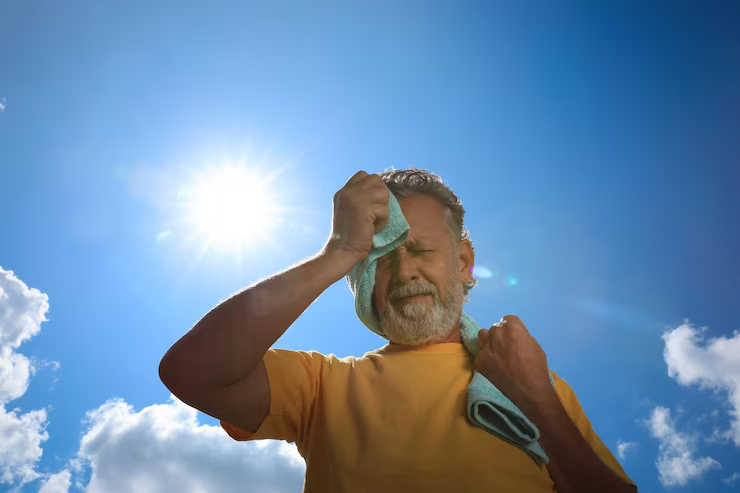As the temperature rises, it’s important to be aware of the risks that come with extreme heat. One of the most serious heat-related conditions is heat stroke, which can be life-threatening if not treated promptly. But how can you recognize the symptoms and provide the right care?
In this post, we’ll walk you through the signs of heat stroke, what to do if you or someone else is affected, and how to prevent it. By the end, you’ll know exactly what steps to take to stay safe during the hottest months of the year.
Let’s dive into how you can recognize heat stroke and get the help you need from a trusted physician in Indore—or wherever you are.
Understanding Heat Stroke: What It Is and Why It’s Dangerous
Heat stroke occurs when your body temperature rises to dangerous levels, typically above 104°F (40°C), and your body can no longer regulate its temperature. It is the most severe form of heat-related illness and requires immediate medical attention. If not treated quickly, heat stroke can lead to organ damage, and even death.
Symptoms of Heat Stroke: How to Spot It Early
It’s essential to recognize the symptoms of heat stroke early to seek medical help quickly. Here are the most common signs:
- High body temperature: Above 104°F (40°C)
- Hot, dry skin: Sweating stops, and the skin becomes red, hot, and dry.
- Rapid pulse or heart rate
- Headache and dizziness
- Nausea or vomiting
- Confusion or agitation
If you notice someone displaying these symptoms, it’s critical to act fast.
What to Do if You Suspect Heat Stroke: Step-by-Step Guide
- Call for Help: Immediately dial emergency services. Heat stroke requires prompt medical attention, so call a physician of Indore or an emergency number if you’re local.
- Move to a Cooler Place: Get the affected person out of the heat and into a shaded or air-conditioned area.
- Cool Down the Body: Use cool water, wet cloths, or ice packs on the person’s body. If possible, use a fan to help lower their body temperature.
- Hydration: If the person is conscious, give them cool water or electrolyte drinks to help rehydrate. Avoid giving them alcohol or caffeine as these can worsen dehydration.
- Monitor the Condition: Keep checking for changes in their condition until medical help arrives.
Preventing Heat Stroke: Tips for Staying Safe in the Heat
While heat stroke can happen suddenly, there are several ways to reduce your risk:
- Stay Hydrated: Drink plenty of water throughout the day, especially in hot weather. Avoid excessive alcohol and caffeine, which can dehydrate you.
- Wear Light Clothing: Choose light-colored, loose-fitting clothing that allows your body to breathe and cool down naturally.
- Limit Sun Exposure: Try to avoid outdoor activities during peak heat, typically between 10 a.m. and 4 p.m.
- Take Frequent Breaks: If you’re working or exercising in the heat, take regular breaks to cool off and drink water.
- Use Sunscreen: Protect your skin from sunburn, which can further increase the risk of heat stroke.
When to See a General Physician in Indore
If you or someone else is experiencing mild symptoms like heat exhaustion, it’s a good idea to consult a general physician in Indore or your local area. They can provide advice on managing heat stress and dehydration. However, if symptoms of heat stroke are present, you should seek emergency care immediately.
FAQs:
1.What are the first signs of heat stroke?
A . The first signs of heat stroke include a high body temperature (104°F or higher), hot, dry skin, and confusion. If you see any of these symptoms, call for help immediately.
2.Can heat stroke occur without sweating?
A.Yes, heat stroke can occur even if the person is not sweating. This is a key indicator that the body’s cooling mechanism is failing.
3.How can I avoid heat stroke during outdoor activities?
A . Stay hydrated, wear light clothing, and take breaks in the shade or a cool environment. Avoid strenuous activities during the hottest part of the day.
Conclusion:
Heat stroke is a serious and life-threatening condition, but it can be avoided with the right precautions. By staying hydrated, recognizing the symptoms early, and seeking help when needed, you can protect yourself and others from the dangers of extreme heat. If you’re unsure about heat-related illnesses or need medical advice, don’t hesitate to visit a general physician in Indore for more guidance on staying healthy during hot weather.
Take Action: If you have concerns about heat stroke or any other health issues, book an appointment with the best general physician in Indore to ensure you’re well-prepared for the summer months ahead.
Want more helpful health tips? Read our blog or contact us today to schedule a check-up with a physician of Indore at Archana Rathi’s Clinic for personalized health care!



